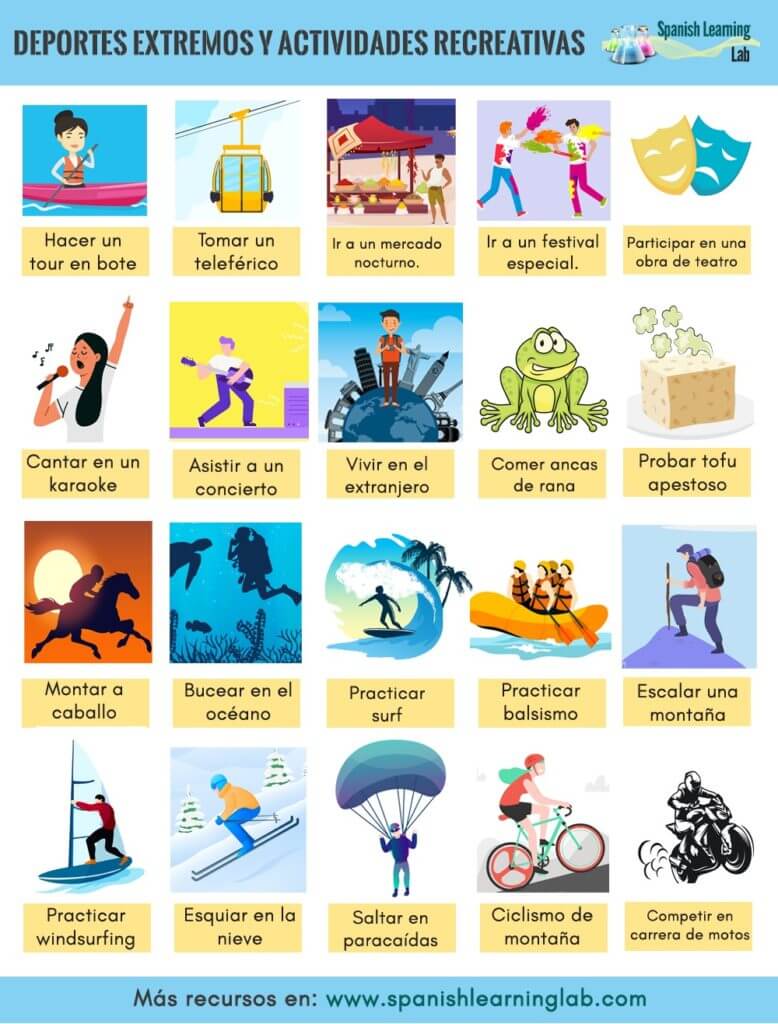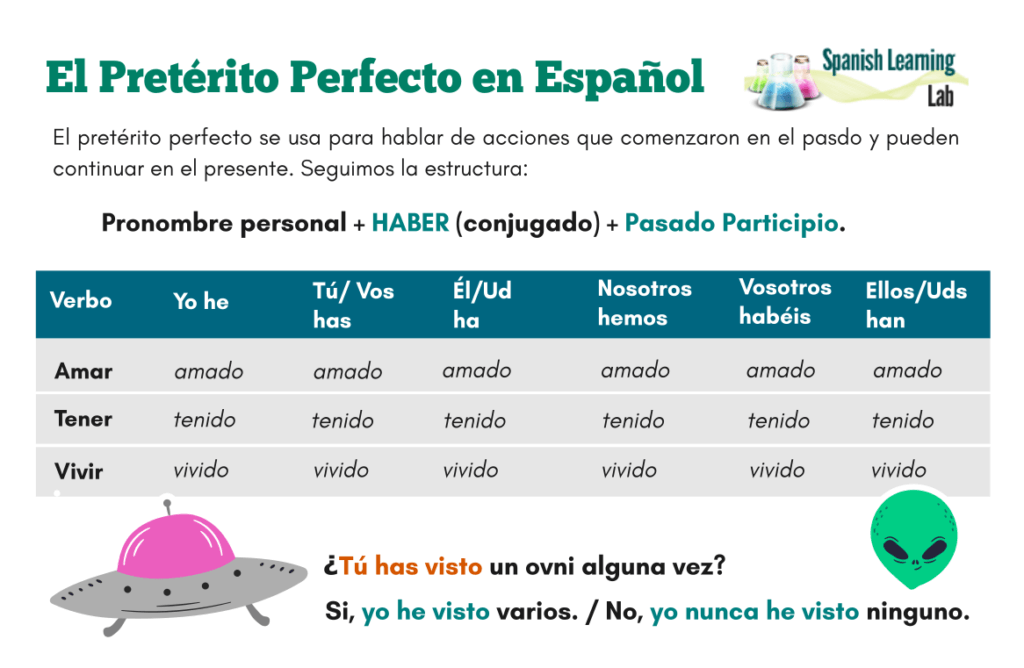¡Hola! Thanks for joining us in this lesson. This time, we’ll learn some of the vocabulary for common life experiences in Spanish people often have throughout their lives, including fun things like riding a horse (montar un caballo) or eating strange foods (like “tofu apestoso”). Additionally, we will discuss the basic rules for the present perfect (pretérito perfecto), and practice with a listening activity and quizzes. Let’s start…
Vocabulary Introduction: Extreme sports and recreational activities in Spanish
First of all, here is a list of names of extreme sports, recreational and unusual things people do throughout their lives. Please take a look at the following picture showing 20 of these activities and their names, including 10 extreme sports and other fun things to do. We will be using this vocabulary in sentences later to illustrate how to talk about any of these things as life experiences in Spanish.

Grammar Focus: The present perfect and life experiences in Spanish
First of all, “El pretérito perfecto” or present perfect in Spanish will be used for activities that began in the past and may have continuity in the present such as life experiences. Since we have covered this tense in a separate grammar lesson, we will focus on using it in sentences and explain the basics at the same time. Pay attention to the following picture for a summary on this tense:

Asking about things people have done…
Next, read and listen to a group of sample questions with the vocabulary about extreme sports and recreational activities that we presented before in order to ask about them as life experiences in Spanish. These statements will follow the next grammatical structure:
¿Alguna vez (optional) + Subject + HABER (conjugated) + Verb in past participle + Complement ?
- ¿Alguna vez has hecho un tour en bote por este lago?
- Have you ever done a boat tour on this lake?
- ¿Ella ha tomado un teleférico alguna vez en su vida?
- Has she ever taken a cable car in her life?
- ¿Ustedes han ido a los mercados nocturnos que hay alrededor de la ciudad?
- Have you been to the night markets around the city?
- ¿Vos has estado en el festival especial que se celebra en mayo en ese país?
- Have you been to the special festival that is celebrated in May in that country?
- ¿Ellos han participado en una obra de teatro en otra ocasión?
- Have they participated in a play on another occasion?
It is somewhat common to add either “alguna vez” or “en alguna/otra ocasión” to these types of questions. We could also add adverbs such as “YA” (already), “NUNCA” (never), “TAMBIÉN” (too) or “TAMPOCO”(yet). These adverbs are commonly placed after the subject or at the end of the statement. Pay attention to these examples:
- ¿Tú ya has cantado en un karaoke en otro idioma?
- Have you ever done a boat tour on this lake?
- ¿Usted nunca ha asistido a un concierto en vivo?
- Has she ever taken a cable car in her life?
- ¿Vosotros también habéis vivido en el extranjero alguna vez?
- Have you been to the night markets around the city?
- ¿Ustedes tampoco han comido ancas de rana en ese restaurante?
- Have you been to the special festival that is celebrated in May in that country?
- ¿Él ya ha probado el tofu apestoso antes?
- Have they participated in a play on another occasion?
Telling others about the things you have done in your life……
Basically, sentences about life experiences in Spanish to reply to those questions will follow the same structure, but omitting the question marks at the beginning and end of the statements. Again, listen and analyze the following group of examples. This time, we will the adverbs “POR” (for) and “DESDE” (since):
- Yo he montado a caballo desde que tengo siete años.
- I have been ridden horse since I was seven years old.
- Marcos ha buceado en el océano desde los 18 años.
- Marcos has dived in the ocean since he was 18 years old.
- María ha practicado surf por más de 15 años, así que es una profesional.
- María has surfed for over 15 years, so she is a professional.
- Nosotros hemos practicado balsismo en ese río y es algo peligroso.
- We have practiced rafting on that river and it is dangerous.
- Ellos han escalado la montaña al menos 10 veces en su vida.
- They have climbed the mountain at least 10 times in their life.
Finally, pay attention to the last group of examples with the present perfect in Spanish in negative sentences using adverbs that would imply negation, such as “NO” or “NUNCA” as well as other words we have seen so far.
- Yo nunca he hecho windsurfing en mi vida ¿Tú lo has hecho?
- I have never done windsurfing in my life, have you?
- Yo no he esquiado en la nieve, pero si he patinado sobre hielo.
- I have not skied in the snow, but I have skated on ice.
- Francisco nunca ha saltado en paracaídas, así que está muy nervioso.
- Francisco has never skydived, so he is very nervous.
- Yo no he hecho ciclismo de montaña desde que era joven.
- I have not been mountain biking since I was young.
- Yo tampoco he competido en carreras de motos porque me dan miedo los accidentes.
- I have not competed in motorcycle races either because I am afraid of accidents.
Listening Activity: Talking about life experiences in Spanish
We got to the end of this lesson. Please keep on practicing by yourself to learn more about the present perfect in Spanish because it is a very important tense in real-life conversations. Check other lessons to learn more about this and other topics. ¡Hasta la próxima!
Related Spanish Worksheets:
- Let’s talk about Sports in Spanish – Conversation cards
- Let’s talk about Travel in Spanish – Conversation cards
- Life experiences in Spanish – Conversation cards
